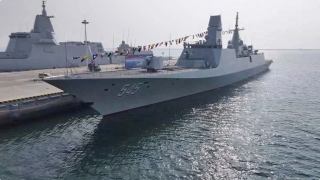Rep. John Moolenaar, who chairs the Congressional select Committee on the Chinese Communist Party, outlined Beijing’s threat in recent remarks at the Wilson Center.
“…the Chinese Communist Party [CCP] poses a military threat to America and our allies, an economic threat to our companies, and an ideological challenge around the world…
“…the CCP understood that Communism can never compete with freedom when it comes to human happiness or prosperity. They knew that the only way they could win was for us to lose. The policies undertaken by the Chinese Communist Party – from poisoning our nation with fentanyl to crippling our economy through abusive trade practices and IP theft – are all aimed at destroying American society. The CCP approaches the United States as an enemy to be harmed rather than as a partner. For the past two years, the Select Committee has demonstrated how the CCP’s aggression in areas like fentanyl, IP theft, transnational repression, Taiwan, and trade are all different fronts in the same war. There is nothing normal about the CCP’s state-led, mercantilist industrial policy that cripples American industry through illegal subsidies, IP theft, and the use of slave labor. There is also nothing normal–let alone, most favored–about our trading relationship with China. It is time for US law to reflect that through new tariff rates that target strategic sectors and boost supply chain resilience. Congress must work with the Administration to reduce the flow of de minimis shipments into the United States, a loophole that this year alone will allow more than a billion shipments to enter the United States – exempt from duties, taxes, and strict scrutiny. We must stem the flow of American capital and tech that is fueling the Chinese military modernization and human rights abuses. American dollars should not finance companies that are developing technology that could someday be used against American service members in a conflict, nor aiding the CCP’s genocide of Uyghur Muslims…”
Some of Moolenaar’s concerns are echoed in research from the Center for Strategic and International Studies “The present period is one of intensifying rivalry, with neither country content with the status quo. Both the United States and China are engaged in a sprawling competition that spans military, economic, technological, diplomatic, and ideational realms, including global governance. Currently, Washington and Beijing do not have any broadly shared purpose that could help the relationship weather shocks and generate resilience.”
The Rand organization, noting that the incoming Presidential Administration will be tasked with dealing with the dilemma, conducted discussions with experts on how the critical issues, including economic tensions, China’s military aggression, and its growing closeness with Russia, will be addressed.
Kristen Gunness, a senior policy researcher at RAND, professor of policy analysis at the Pardee RAND Graduate School, and former Director of the Navy Asia Pacific Advisory Group at the Pentagon, believes that “Among the most salient issues is China’s support for Russia. It is also crucial to address China’s influence operations and disinformation campaigns and to push back on and deter Chinese military aggression in the Indo-Pacific region.”
Jennifer Bouey, the Tang Chair for China Policy Studies, a senior policy researcher and epidemiologist at RAND, and a professor of policy analysis at the Pardee RAND Graduate School, Jennifer Bouey The geopolitical rivalry with China has consumed significant American effort and resources—and remains a work in progress. This is the challenge of our times, not just for the United States and China, but also for the world. warns that “The United States must find ways to compete with China without compromising its own values, economy, and security. The challenge to the United States also includes maintaining channels for high-level meetings to negotiate on new threats (e.g., AI, biosecurity) and avoiding wars.”
China is a unique adversary, unlike any the United States has ever faced in the last two centuries. It has the same advantage in industrial resources that America had in World War II. Its nuclear arsenal is growing rapidly, and it currently possess the world’s largest army and navy, along with an advanced scientific and technological capability.
Photo: China’s first Type 054B frigate, the Luohe, was commissioned in the People’s Liberation Army Navy recently in a military port in Qingdao, east China’s Shandong Province. (China Defence Ministry photo)
